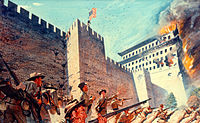
Photo from wikipedia
mitigate against local political interference and generate countervailing pressure on police and political incumbents to keep police misconduct in check. Second, the argument operates at multiple levels of analysis, from… Click to show full abstract
mitigate against local political interference and generate countervailing pressure on police and political incumbents to keep police misconduct in check. Second, the argument operates at multiple levels of analysis, from the subnational to the national. Although the empirical analysis effectively uses the historical record to foreground the texture and mechanics of political capture at the local level, more attention to the potential for political capture at higher levels of government would have been welcome. Likewise, the local-level capture of police for instrumental ends may not operate solely according to local-level political logics. It may instead respond to demands issued by politicians and party machines situated at higher levels of government and on whom local incumbents depend for resources and political advancement. Third, the study assumes that citizen trust in police is negatively correlated with police misconduct; however, citizens can also support police engaging in forms of misconduct, including extralegal violence, amidst the politicization of security or the high levels of crime and insecurity in much of Latin America and other developing world regions. It would have been interesting if Esparza had discussed whether and how his argument might apply in such contexts. In brief, Policing and Politics in Latin America is an insightful book that should find a wide audience among scholars of crime, policing, security, state violence, and subnational politics.
Journal Title: Perspectives on Politics
Year Published: 2023
Link to full text (if available)
Share on Social Media: Sign Up to like & get
recommendations!